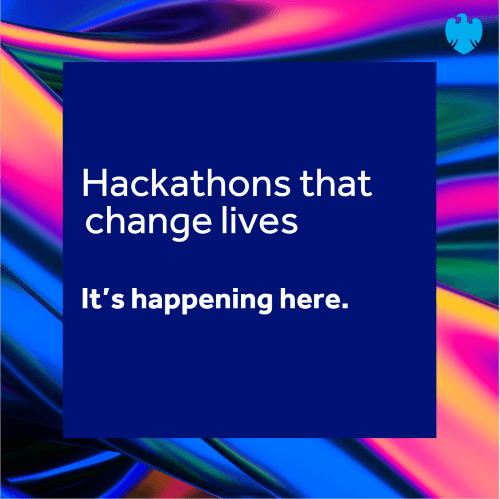
One of the most rewarding things about working in tech for Barclays is that our teams get to see the difference their work makes to millions of people every day. From the heady world of governments and global finance to the smartphone app that pays for your shopping, our technology helps to make the economy work.
But that’s not where the story ends. When you have a real sense of purpose, you want to keep on elevating and increasing the positive impact you have. Barclays is committed to championing innovation and sustainability. Our purpose is to deploy finance responsibly with empathy and integrity, for the common good and the long term. And our people do all kinds of work to bring that purpose to life in the community.
So what does it take to make a difference? In Emma Williamson’s experience, it takes 24 hours, 24 very committed teams of tech people, some magicians and a lot of pizza.
Emma works in Cloud and Middleware within global Group Technology Infrastructure Services, otherwise known as GTIS. GTIS support and supply all of the tech infrastructure Barclays needs to function. That means all the services, networks, voice and data centres that underpin our teams, including third-party applications and products.
In her current role, as Head of Cloud Transformation, Emma and her team identify ways to improve process, service and people investment, to ensure that our colleagues can take full advantage of all the potential that working in the Cloud has to offer. “People are really the key. It’s my job to make sure our teams take the time to invest in themselves and explore new ideas. Most days, we’re heads down and focused on delivery.”
We have to give our people the room to learn new things and to think about how we could do things differently. Because that’s where the best ideas and the biggest sense of purpose often comes.
Sometimes, that means getting creative. “We decided to do a hackathon for three reasons. It was a way of bringing people together, across the globe, and helping them learn from each other, outside of their everyday roles. We wanted to give people their first chance to explore the new Barclays Public Cloud platform, Microsoft Azure Red Hat OpenShift. And we wanted to make a real difference to a great cause”
Just like that, CodeFest was born. The competitive hackathon was open to everyone across Group Technology. “We invited people with a whole range of skills to apply. And it worked. From product managers to project managers, engineers and execs, we had people from all kinds of roles and every area in technology. It was an inclusive community of people and ideas,” explains Emma.
Emma and her team hosted the hackathon simultaneously in India and UK, at our Pune and Radbroke campuses. There were 230 participants working in teams of up to 10 people.
Places were in high demand, as some signed up as full teams, whilst others were allocated teams based on their skills. There was even a waitlist for people who narrowly missed out. All the participants were invited to immersive training workshops and briefing calls to build excitement, share knowledge and lay the groundwork for the day.
Meanwhile, Emma was looking for the right charity to partner with. “Obviously, a lot of established charities have a highly developed digital strategy and infrastructure. So, we wanted to work with a charity that was in a critical stage of development.”
We wanted to make sure we could make a real difference and deliver something that helped the charity succeed.
Fortunately, one of the team in London had just become trustee of a new charity. Start Young UK provides mentoring, sponsorship and managed support for underprivileged children, from ages 5-18.
“It’s really shocking how many children in London live in poverty. One of the simple, but really powerful things Start Young UK does is provide sponsorship for extra-curricular activities like school trips, clubs, Scouts and Guides. It means that kids don’t have to miss out just because their families don’t have the disposable income of their classmates.”
A new and emerging charity, Start Young UK needed help in three key areas: managing the admin around growth; bringing in more sponsorship; engaging with schools, sponsors and children in a secure way.
These three elements formed the core of the CodeFest22 brief. Teams could choose to deliver a solution that answered to one of the charity’s challenges or tackle multiple issues at once. “We didn’t want to be too specific. The whole point was to get people thinking and collaborating broadly. We wanted to see where teams would take the briefs. Ultimately, we were blown away by the creativity and quality they delivered,” says Emma.
The big day itself was a huge success and a gargantuan effort. “We owe a big thanks to the team at Microsoft. They were great partners. This was the first time our teams got to experience what Azure will look like for Barclays workloads. They built us a separate cluster, apart from Barclays systems, but accessible with our Barclays.com email addresses. They offered our teams lots of training before the day. And they were on-hand throughout the hackathon to talk about the platform.”
Our first-ever CodeFest ran across 28th and 29th of September. We started at 5:30pm in India and mid-day in UK. The deadline was 24 hours later. Then everyone took a break before they presented their ideas to the judging panels.
“We had DJs, magicians and fitness coaches to create a constant buzz of activity and keep people engaged. We also provided food. Lots of food. There were healthy options. But suffice to say we ended up sending out for even more pizza!”
A lot of teams worked through the night. “One guy even brought a sleeping bag to nap under his desk.“ But all that energy was well spent. “The range of solutions was remarkable,” says Emma. One team created a standalone app, aimed at raising awareness on the statistics around child poverty. One team ignored coding altogether and put together a slick presentation on what an app could deliver.
After regional judging, four teams were selected to present their ideas to the global judging panel. The ultimate winners were the Young Coders, a team from Pune containing several developers who were in their first year on the graduate scheme.
“Their solution was really clever and considered,” says Emma. The Young Coders tackled the sponsorship brief with a new website. But they went far beyond that to create a full, usable application with chatbots, telemetry and metrics. “They understood that an emerging charity wasn’t going to be very tech proficient and built the website accordingly. They had thought about how the charity would use the site every day. Everything was laid out in a simple and straightforward way. It was fully formed delivery with separate locked-down areas for sponsors, mentors and admin.”
The Young Coders, with some help from Emma and her team, have been bringing the plan to life ever since. “We are building out the app to production and handing it over to Start Young UK in March 2023.“ Barclays is also covering the hosting costs for the first year to ensure that the website is fully up and running without extra outlay from the charity.
Suffice to say, CodeFest was a big success. “Our teams learned a lot. They had the chance to work with brand new tech and take a project all the way from idea to delivery. And, crucially, people got to work outside their current teams and roles.”
It was great to do something for an amazing charity. A fun, buzzy event with a real sense of purpose.
In fact, CodeFest helped one of the competitors, who was a developer in Operations, to recognise that his heart lay with hands-on coding. He now splits his week between engineering and supporting the Radbroke Command Centre.
With all this positivity, it’s hardly surprising that CodeFest will now be an annual event. CodeFest 2023 will be on October 11th and 12th. And the plans are bigger and better than ever. “Last year, we weren’t able to run the event on our Whippany campus, but we’ll be making a big push to involve more regions this year.”
So what learnings will Emma and her team take to CodeFest 2023? “The magicians were really popular, fitness classes less so. But mainly it’s about the food. Making the world a better place is hungry work.”


